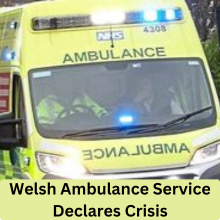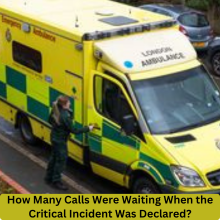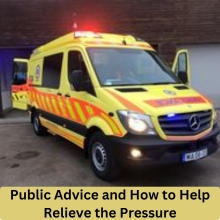
On Monday evening, the Welsh Ambulance Service declared a ‘critical incident’ due to a sharp increase in demand for emergency services. This declaration came after over 340 calls were awaiting response and more than half of the ambulance fleet was tied up waiting to hand over patients outside hospitals. As a result, response times for emergency calls have drastically increased, leaving many people waiting for hours, or even longer, for an ambulance.
A critical incident is the highest alert level used by the NHS, allowing healthcare providers to take immediate action to ensure the continued delivery of essential services. But how did it come to this point? What does this mean for patients and the wider healthcare system in Wales? Let’s break it down.
What is a Critical Incident in Healthcare?
A critical incident in healthcare refers to a situation where the normal functioning of the service is severely compromised due to an overload of demand. When a critical incident is declared, it allows health services to take urgent steps to manage the crisis, such as reallocating resources, calling in additional support, and even re-prioritizing cases.
This declaration is usually made when the situation becomes so dire that it threatens patient safety and the ability of healthcare staff to provide care in a timely manner. The Welsh Ambulance Service’s decision to declare a critical incident was made after extensive delays, with ambulances waiting outside hospitals for hours due to the inability to hand over patients.
Why Did the Welsh Ambulance Service Declare a Critical Incident?
The Welsh Ambulance Service has faced an overwhelming increase in demand over recent weeks. Several key factors have contributed to this surge:
- Surge in Call Volumes: With over 340 calls waiting to be answered at the time of the declaration, the pressure on emergency dispatch was immense. These calls are not just simple queries; they represent urgent requests for medical help.
- Handover Delays at Hospitals: More than half of the ambulance vehicles were unable to hand over their patients at hospitals due to overcrowded emergency departments. This delay means ambulances are stuck outside, unable to respond to new calls.
- Increased Demand Across the Board: Various seasonal factors have led to a rise in medical emergencies. Increased respiratory illnesses, flu outbreaks, and the ongoing impacts of COVID-19 have placed immense strain on the healthcare system.
The Current State of the Welsh Ambulance Service
Right now, the situation in Wales is critical, with healthcare professionals stretched thin. Staffing shortages, longer response times, and vehicles waiting outside hospitals are contributing to the crisis.
- Staffing Shortages: There is a significant shortage of ambulance staff, partly due to illness and burnout. This shortage has made it harder to maintain response times and meet the demand.
- Increased Response Times: The time it takes for an ambulance to arrive at the scene of an emergency has dramatically increased. Many patients have reported waiting for hours for assistance, which can be life-threatening in some situations.
- Ambulances Waiting Outside Hospitals: At its peak, more than 90 ambulances were waiting outside hospitals for patient handovers. This not only delays the care of new patients but also strains hospital staff, who are already dealing with a high volume of patients.
How Many Calls Were Waiting When the Critical Incident Was Declared?
At the time of the declaration, over 340 calls were waiting to be answered across Wales. This backlog of calls indicates just how overwhelmed the system is, and it is a stark reminder of the increasing pressure on emergency services. This delay in answering calls results in a slow response to emergencies, with serious consequences for patient care.
Also read: Squid Game Season 3: You Won’t Believe the Release Date
What Caused the Increased Demand for Ambulance Services?
Several factors have contributed to the unprecedented demand on the Welsh Ambulance Service. These include:
- Rise in Respiratory Illnesses: Many patients are seeking urgent care for respiratory issues, particularly due to the flu season and lingering COVID-19 cases.
- Winter Pressures: Winter brings with it a host of seasonal illnesses, from cold-related injuries to viral infections. These contribute to a sharp increase in the need for emergency medical care.
- COVID-19 Aftermath: The pandemic continues to strain healthcare systems, with long-term effects on both staffing levels and public health. The backlog of cases from the pandemic is still being felt today.
Impact on Hospitals and Emergency Departments
The surge in demand has not only affected the Welsh Ambulance Service but has also put a tremendous strain on hospitals and emergency departments across Wales. Many hospitals are seeing long queues outside their emergency departments, with ambulances stuck waiting for hours before they can hand over patients.
Impact on Hospital Staff: With emergency rooms overwhelmed, hospital staff are under extreme pressure. They are not only dealing with an influx of patients but also trying to manage the backlog of those waiting to be admitted.
Public Advice and How to Help Relieve the Pressure
The Welsh Ambulance Service is urging the public to help reduce the pressure on the system by only calling 999 for life-threatening emergencies.
Some examples of true emergencies include:
- Cardiac arrest
- Breathing difficulties
- Loss of consciousness
- Choking
- Catastrophic bleeding
For non-urgent medical issues, the public is encouraged to use alternative services such as:
- NHS 111 Wales for advice
- Consulting a GP, pharmacist, or visiting a minor injuries unit
By reserving 999 calls for emergencies, the ambulance service can focus its resources where they are most needed.
What Measures Are Being Taken to Address the Crisis?
In response to the critical incident, the Welsh Ambulance Service has put in place several measures to help alleviate the pressure:
- Mutual Aid: The service is working with other health boards to share resources and provide additional support where needed.
- Additional Staffing: Efforts are being made to recruit more staff to help handle the increased demand.
- Streamlining Handover Processes: Measures are being explored to speed up the handover of patients at hospitals, allowing ambulances to respond more quickly to new calls.
Comparison with Other NHS Trusts Across the UK
The situation in Wales is not unique. Other NHS trusts across the UK have also faced similar pressures. For example, Walsall Healthcare NHS Trust and Hampshire Hospitals NHS Foundation Trust both declared critical incidents earlier this year due to high demand in their emergency departments.
The situation is reflective of broader trends across the NHS, where many services are operating under extreme pressure due to rising demand, staff shortages, and the ongoing effects of the pandemic.
How Are the Welsh Government and Local Authorities Responding?
The Welsh Government has pledged additional funding to support the NHS in Wales and is working closely with health boards to implement measures that ease the strain. The introduction of new public health rules, such as wearing face masks in hospitals, is also part of efforts to control the spread of respiratory infections.
The Role of Social Media and Public Perception
The role of social media in shaping public perception of this crisis cannot be underestimated. Media coverage, combined with personal stories from patients, has helped raise awareness of the growing challenges facing emergency services. Public understanding of the situation can go a long way in reducing unnecessary pressure on the service.
What Are the Long-Term Solutions to Prevent Future Critical Incidents?
In the long term, addressing these issues will require a combination of strategies:
- Investment in Healthcare Infrastructure: This includes both physical infrastructure, like hospital beds and ambulance fleets, and technological improvements to improve efficiency.
- Staffing Solutions: Recruiting more staff and improving staff retention rates will be crucial to ensuring that the service can handle future demand.
What Can the Public Do to Help?
The public can play a critical role in alleviating the pressure on the ambulance service by following the advice provided by healthcare professionals. This includes only calling 999 in emergencies, avoiding unnecessary hospital visits, and using alternative healthcare options when possible.
Also read: SpaceX’s Bandwagon-2 Launch: A Game-Changer for Space
Conclusion
The declaration of a critical incident by the Welsh Ambulance Service highlights the mounting pressures facing emergency services in Wales. With increased demand, staffing shortages, and delays in hospital handovers, the system is under immense strain. However, by following the advice provided by the ambulance service and using alternative healthcare options where possible, the public can help alleviate some of this pressure.
FAQs
What is a ‘critical incident’ in the Welsh ambulance service?
A ‘critical incident’ occurs when the demand on the service exceeds its capacity, impacting its ability to provide timely care. It triggers immediate action to manage the situation and ensure patient safety.
How can I help reduce the pressure on the Welsh ambulance service?
You can help by only calling 999 for life-threatening emergencies and using alternative services like NHS 111, GPs, or pharmacies for non-urgent concerns.
Why are ambulance waiting times so long in Wales?
Waiting times are long due to high demand, staffing shortages, and delays in handing over patients at hospitals, which tie up ambulances and prevent them from responding to new calls.
What should I do if I need medical help but it’s not an emergency?
For non-emergencies, you can consult NHS 111 Wales, your GP, or visit a minor injuries unit. Pharmacists can also provide advice on common health issues.
Is this situation unique to Wales or are other areas facing similar issues?
Similar challenges are being faced across the UK. Many NHS trusts have declared critical incidents due to rising demand and pressure on emergency services.

